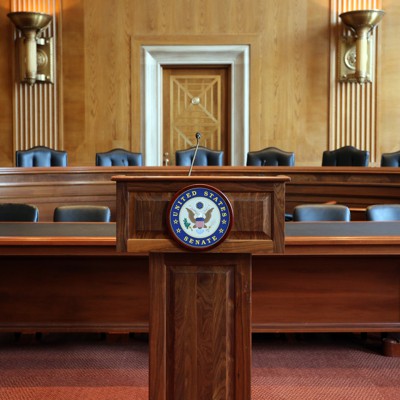The Senate Commerce Committee released its version of the controversial 10-year ban on states regulating artificial intelligence, in text that diverged from the House-passed version.
For its section of the reconciliation bill — known by President Donald Trump and Republicans as the “One Big, Beautiful Bill” — the committee would hold back funds for deploying broadband internet and AI infrastructure from states that want to regulate the technology over the 10-year period of the moratorium. That’s different from the House text, which would ban states outright from regulating AI for a decade.
Despite the softer language, the Senate text is still far from ideal for a growing bipartisan group of lawmakers who want to see any moratorium killed outright.
U.S. Sen. Ed Markey, a Massachusetts Democrat, pledged during a virtual roundtable and on the Senate floor to lead the effort to kill the provision as a violation of Senate rules. And he appears to have found an unlikely ally on the opposite side of the aisle: Rep. Marjorie Taylor Greene, a Republican of Georgia who voted in favor of the legislation and the 10-year moratorium, but now has said she regrets her vote.
“AI is rapidly developing,” Greene said in a speech on the House floor. “AI has developed quickly over the past few years; imagine what it will be one year from now, five years from now, and 10 years from now. When we look to the future, we cannot take away states’ rights to regulate or make laws to protect the people in their state or to regulate businesses that operate in their state. That would be destroying the very foundation of this country, which is federalism. We must always limit federal power and protect state power.”
While federal opposition to the moratorium appears to be building across party lines, state leaders are similarly concerned. In a joint letter, more than 200 representatives from various state legislatures wrote to express their “strong opposition” to any moratorium on AI regulation. They warned that any federal ban on state action would “wipe out” various state laws, including those that look to protect residents from some of the technology’s worst harms. A bipartisan coalition of state attorneys general have also voiced their concerns about the moratorium.
“In an increasingly fraught digital environment, young people are facing new threats online, seniors are targeted by the emergence of AI-generated scams, and workers and creators face new challenges in an AI-integrated economy,” the lawmakers wrote in the letter. “Over the next decade, AI will raise some of the most important public policy questions of our time, and it is critical that state policymakers maintain the ability to respond.”
Americans for Responsible Innovation, the nonprofit that coordinated the letter, also pointed to new research that found that a moratorium would prevent enforcing measures designed to protect children’s online safety and consumers, among others. “It’s obvious why so many state lawmakers, attorneys general, and voters have spoken out against the AI ban: its impact would reach into nearly every area of tech policymaking for the next decade,” ARI President Brad Carson said in a statement.
Separately, nonprofit Common Sense Media released a poll of its own in late May showing strong bipartisan opposition to federal preemption of state AI regulations. Vast majorities of voters surveyed are worried about the potential effects of AI on young people, and, while they said they support technology and innovation, it should not come at the expense of protecting children.
At a roundtable hosted last week by Markey and representatives from several groups, Common Sense Media CEO and founder James Steyer called the moratorium “irresponsible and indefensible.”
“Not only does it infringe upon states’ rights, but it stops states like California, which have really been the key places to regulate the tech industry over the past decade, from regulating AI and all the potential downsides and harms without putting any federal protections in place, and fundamentally leaving kids, families and consumers to fend for themselves against the most powerful technology of our times,” Steyer said.
Experts repeated their concerns about this moratorium coming into effect when there are no federal AI regulations in place. Various bills have been introduced previously, including Markey’s own AI Civil Rights Act, but as yet nothing has been enacted by Congress.
“Unless and until we have that alternative, we should not be banning what’s happening at the state level,” Damon Hewitt, president and executive director of the Lawyers’ Committee for Civil Rights Under Law, said during the roundtable.
Instead, observers called on the federal government to partner with state and local governments and set a minimum baseline of AI regulations, then allow the other levels of government to regulate further where they see fit.
“The beauty of what state and local governments can do is take things one step further based on the use cases and the harms or the risks that they see present in their states and in their communities,” Asha Palmer, senior vice president of compliance solutions at software training company Skillsoft, said in an interview. “That’s the important part, because what may be a harm in California may not be a harm in Maryland, may not be a harm in Texas.”
The prospects for the bill and the moratorium remain unclear. Greene urged the Senate to remove the AI moratorium from the bill, and told her House colleagues to remove it if it remains intact. She said the legislation should be focused on tax policy, not “allowing AI to run rampant and destroying federalism in the process.”


